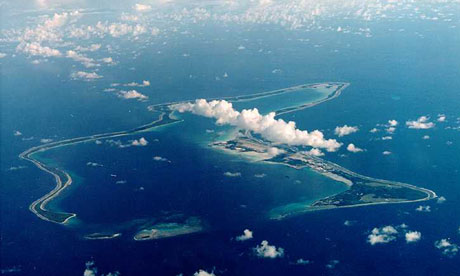The Guardian
Leaked document shows Foreign Office official told US that marine reserve would end evicted islanders' claims

The prime minister of Mauritius has accused Britain of pursuing a "policy of deceit" over the Chagos islands, its Indian Ocean colony from where islanders were evicted to make way for a US military base. He spoke to the Guardian as his government launched the first step in a process that could end UK control over the territory.
Navinchandra Ramgoolam spoke out after the Labour government's decision to establish a marine reserve around Diego Garcia and surrounding islands was exposed earlier this month as the latest ruse to prevent the islanders from ever returning to their homeland.
A US diplomatic cable dated May 2009, disclosed by WikiLeaks, revealed that a Foreign Office official had told the Americans that a decision to set up a "marine protected area" would "effectively end the islanders' resettlement claims". The official, identified as Colin Roberts, is quoted as saying that "according to the HMG's [Her Majesty's government's] current thinking on the reserve, there would be 'no human footprints' or 'Man Fridays'" on the British Indian Ocean Territory uninhabited islands."
A US state department official commented: "Establishing a marine reserve might, indeed, as the FCO's Roberts stated, be the most effective long-term way to prevent any of the Chagos Islands' former inhabitants or their descendants from resettling in the BIOT."
Nearly a year later, in April this year, David Miliband, then foreign secretary, described the marine reserve as a "major step forward for protecting the oceans". He added that the reserve "will not change the UK's commitment to cede the territory to Mauritius when it is no longer needed for defence purposes".
"I feel strongly about a policy of deceit," Ramgoolam said , adding that he had already suspected Britain had a "hidden agenda".
Asked if he believed Miliband had acted in good faith, he said: "Certainly not. Nick Clegg said before the general election that Britain had a "moral responsibility to allow these people to at last return home". William Hague, now foreign secretary, said that if elected he would "work to ensure a fair settlement of this long-standing dispute".
Ramgoolam said he believed the government was adopting the same attitude as its predecessor. Mauritius has lodged a document with an international tribunal accusing Britain of breaching the UN convention on the law of the sea. It says Britain has no right to establish the marine zone since it was not a "coastal state" in the region, adding that Mauritius has the sole right to declare an "exclusive zone" around the British colony.
A legal document seen by the Guardian and submitted to an international tribunal says that in 1965 Britain "dismembered Mauritius by purporting to establish a so-called 'British Indian Ocean Territory'". Eight years later, it "forcibly removed the entire indigenous population of the Chagos archipelago, comprising a community of approximately 2,000 persons calling themselves Ilois or Chagossians", the document says.
Referring to the leaked US cable, it adds that the UK has "violated the 1982 [UN] convention and rules of general international law …" It says Mauritius is basing its claims on additional international rules including "the principle of permanent sovereignty over natural resources".
Ramgoolam said: "We have a strong case". Asked if the move paves the way to the end of the British Indian Ocean colony, he replied: "We have a broad strategy." Mauritius would adopt a "step by step" approach. He added that the Americans at present needed the Diego Garcia base for reasons of "international security".
An FO spokesman said: "We are aware that Mauritius have lodged an application under the 1982 UN Convention on the Law of the Sea". The FO added that the marine reserve was established "without prejudice" to the case before the European human rights court – an apparent admission that the reserve could not prevent the islanders returning if they won their case.

No comments:
Post a Comment